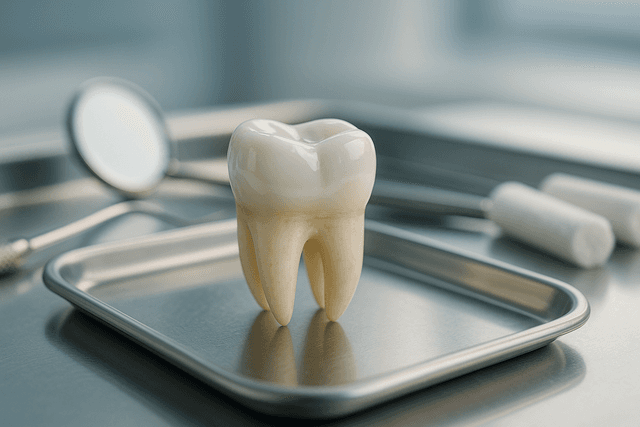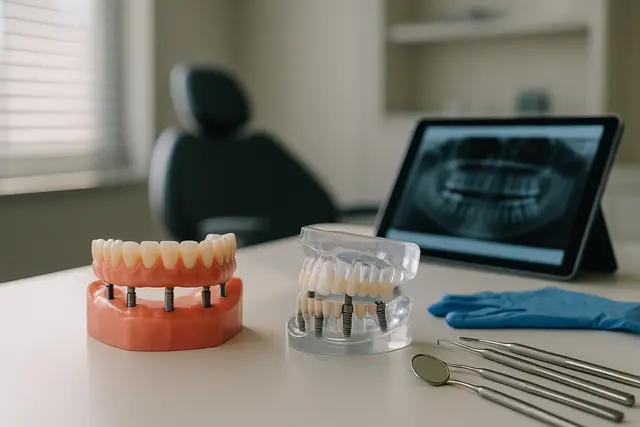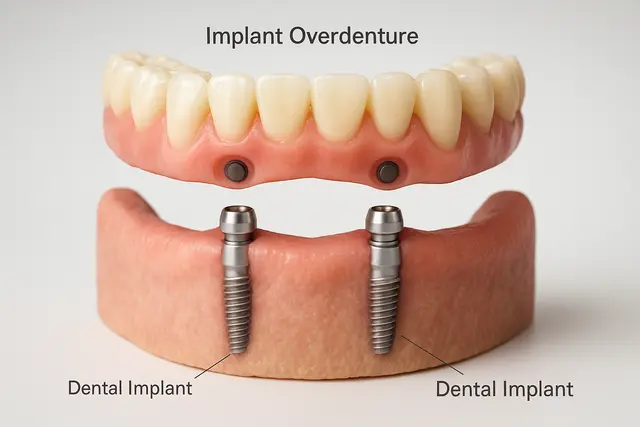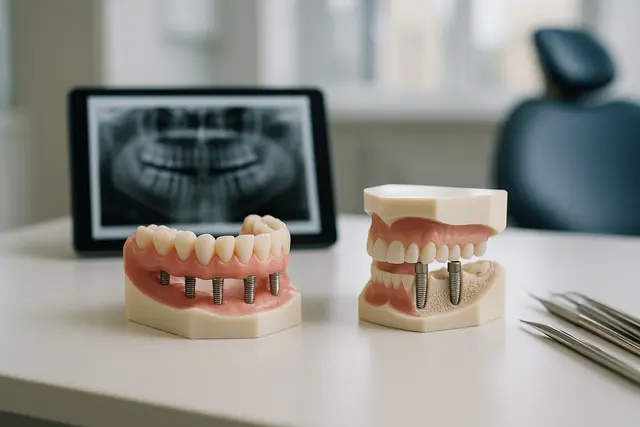Prosthodontics
5 min read
Sep 08, 2025
Tooth With a Crown: Benefits, Care Tips, and Lifespan
Dental crowns are a trusted solution in restorative dentistry, designed to protect damaged teeth and restore their function and appearance. Whether you're dealing with decay, fractures, or post-root canal recovery, a crown can offer long-lasting support while blending seamlessly with your natural smile.

Let’s talk about crowns. Not the royal kind (although they do give your smile a regal touch), but the kind your dentist might recommend if your tooth is waving the white flag. Whether you've got a fractured tooth, a broken tooth, or a case of tooth decay that's gone too far, a dental crown might just be the unsung hero your tooth needs.
Crowns are incredibly common in modern dentistry. They’re like helmets for your teeth, protecting the vulnerable parts while restoring strength, shape, and confidence. So, if you’re wondering whether you need a dental crown, what kind is best, and how long they actually last, keep reading.
When Your Tooth Needs a Crown
Let’s say you’ve chipped your tooth trying to bite open a stubborn snack bag (we’ve all been there). Or maybe you've had a root canal treatment and now have a tooth that’s basically hollowed out like a chocolate bunny. This is where a crown steps in.
Dentists recommend crowns to cover and protect teeth that are too weak, worn down, or decayed for a simple filling. A crown covers the entire visible surface of the tooth, keeping the structure intact and saving you from more invasive procedures like extractions or dental implants.
A crown may be needed if:
You have a large cavity or advanced tooth decay.
There’s a fracture that compromises your tooth structure.
You’ve had root canal therapy.
You’ve cracked a tooth but the root is still healthy.
You’re getting a dental implant or bridge.
The goal? Restore the function and look of the affected tooth while keeping your natural tooth structure whenever possible.
Understanding the Dental Crown Procedure
So what happens when you need a crown? The dental crown procedure isn’t a one-and-done deal, but it’s not scary, either.
First, your dentist will prepare your tooth by removing any damaged or decayed parts. This step ensures the crown fits snugly and won’t irritate the gum or surrounding teeth. They’ll also shape the tooth for a better fit. This is known as preparing your tooth.
Next come dental impressions. These help the dental lab create a custom dental crown that matches the size, color, and shape of the original tooth. In the meantime, you’ll get a temporary crown to keep your tooth protected while the real deal is being made.
When your new crown is ready, your dentist will check how it fits, make any needed tweaks, and cement it in place using dental cement. Voilà, crown placement complete. The result is a durable, lifelike restoration that blends in with your natural teeth and makes eating (and smiling) feel normal again.
Why Crowns Are a Smart Fix for Fractures and Decay
Crowns to cover a fractured tooth or decayed or broken tooth are not just about looking pretty. They’re a powerful defense against further damage.
For fractures, crowns act like a cast, keeping the remaining parts of your tooth together and preventing breaks from worsening.
If your tooth enamel is worn or cracked, a crown can help distribute bite force evenly and reduce pain.
For decay, especially when it’s beyond a filling’s help, the crown protects the remaining tooth from bacteria and future tooth decay.
After root canal therapy, when the tooth becomes brittle, a crown is almost always necessary to restore function and protect the treated tooth.
Crowns can also improve your smile, boost your confidence, and enhance the appearance of your entire tooth. It’s both functional and cosmetic.
Types of Crowns and What Makes Them Different
There are several types of crowns, each with its perks.
Porcelain crown: Great for front teeth because they mimic natural tooth color beautifully.
Zirconia crowns: Extremely strong and durable, ideal for molars that do the heavy chewing.
Ceramic crown: Aesthetic and metal-free, often used when cosmetic concerns are top priority.
Metal crown: Usually made of gold or alloys, they’re durable but stand out visually.
Metal-based crown: A mix of porcelain and metal, offering both strength and a natural look.
Temporary crown: Made from acrylic or composite, this one’s your tooth’s placeholder while waiting for the permanent crown.
Full crown: Covers the entire surface of the tooth, offering maximum protection.
Crowns can be made in dental labs by skilled dental technicians who ensure your new crown fits comfortably and looks just right. The quality of the crown can impact its durability and feel, so always discuss materials with your dentist.
How to Care for a Tooth With a Crown
Think your job is done once your crown is placed? Not quite. A crown needs just as much love as your natural teeth.
Dental care tips:
Brush twice a day with fluoride toothpaste to protect the underlying tooth.
Floss daily to remove plaque at the gum line (yes, even around crowns).
Avoid chewing ice or using your teeth to open things, your crown won’t like it.
Wear a nightguard if you grind your teeth.
Crowns can also loosen over time, especially if too much tooth is left on the tooth during prep. If you ever feel your crown is wobbly or causing pain or discomfort, call your dentist right away.
How Long Do Crowns Last and What Affects Their Lifespan?
Crowns can last anywhere from 5 to 15 years, or even longer, depending on the material, how well the crown fits, and how you care for it.
Porcelain might chip over time.
Zirconia tends to outlast most materials.
Metal crowns are practically indestructible (but not so pretty).
Dental crowns can last longer if:
You practice good oral hygiene.
You avoid hard or sticky foods.
You see your dentist for regular checkups.
Crowns can also fail if the underlying tooth gets new decay or if the gum around it recedes. The key is to treat the crown like your own tooth. Or better.
Dental Implants and Crowns: A Dynamic Duo
Sometimes, the tooth is too far gone and has to be removed. In that case, a dental implant topped with a crown is the go-to option. Implants use a titanium post to act as the root, and then a crown is placed on top.
Dental implants look, feel, and function like natural teeth. They prevent bone loss and keep neighboring teeth from shifting. If your dentist may suggest an implant, it’s worth considering, it’s one of the most stable long-term solutions in dentistry.
When Does a Tooth Need a Crown?
A crown is usually recommended when a tooth is too weak, fractured, or decayed to support a filling alone. Common situations include teeth that have undergone root canal treatment, large cavities, cracked enamel, or cosmetic concerns. A crown acts like a protective shield, covering the entire visible surface of the tooth to restore its function, strength, and appearance.
What Are the Different Types of Dental Crowns?
Crowns come in several materials, each with specific benefits. Porcelain crowns blend seamlessly with front teeth for natural aesthetics. Zirconia crowns are extremely durable, making them ideal for molars. Ceramic crowns are metal-free and favored for cosmetic purposes. Metal crowns, often gold or alloys, provide unmatched strength but are less discreet. There are also porcelain-fused-to-metal crowns that balance durability with a natural look, as well as temporary crowns that protect the tooth until the permanent one is ready.
How Do You Care for a Tooth With a Crown?
Caring for a crowned tooth requires the same diligence as natural teeth. Brush twice daily with fluoride toothpaste, floss carefully to prevent plaque around the gum line, and avoid biting down on hard items like ice. If you grind your teeth, a nightguard can prevent premature damage to the crown. Regular dental checkups are essential to ensure the crown stays secure and the underlying tooth remains healthy.
How Long Does a Dental Crown Last?
The lifespan of a crown typically ranges from 5 to 15 years, but with excellent care, some last decades. Durability depends on the material, zirconia and metal crowns are longer-lasting, while porcelain is more prone to chipping. Lifestyle habits such as chewing hard foods, clenching, or neglecting oral hygiene can shorten a crown’s lifespan. Proper care and regular dental visits greatly extend its longevity.
Read Next
Related Posts

Prosthodontics
Implant Supported Dentures Overview
Missing teeth can impact more than just your smile, they can affect your confidence, comfort, and even your diet. Fortunately, modern dentistry offers a solution that’s both secure and natural-looking: implant-supported dentures. This innovative approach blends the stability of implants with the convenience of dentures to create a long-lasting, life-improving upgrade.
5 min read
Oct 29, 2025

Prosthodontics
Implant Overdentures Explained: The Hybrid Solution to Missing Teeth
Missing teeth can impact everything from your ability to eat to your self-confidence. While traditional dentures have long been a go-to solution, they often fall short in comfort and stability. Implant overdentures offer a modern alternative that combines the security of dental implants with the convenience of removable dentures, a true upgrade for those looking to reclaim their smile.
6 min read
Oct 29, 2025

Prosthodontics
Implant Retained Dentures Explained
Considering implant-retained dentures? You're not alone. As modern dentistry evolves, more people are turning to this secure, natural-feeling alternative to traditional dentures. This guide will walk you through what they are, how they work, and why they might be the solution you've been looking for.
4 min read
Oct 28, 2025
Don’t have time to research every dentist around you?
See why 30k+ patients trusted us